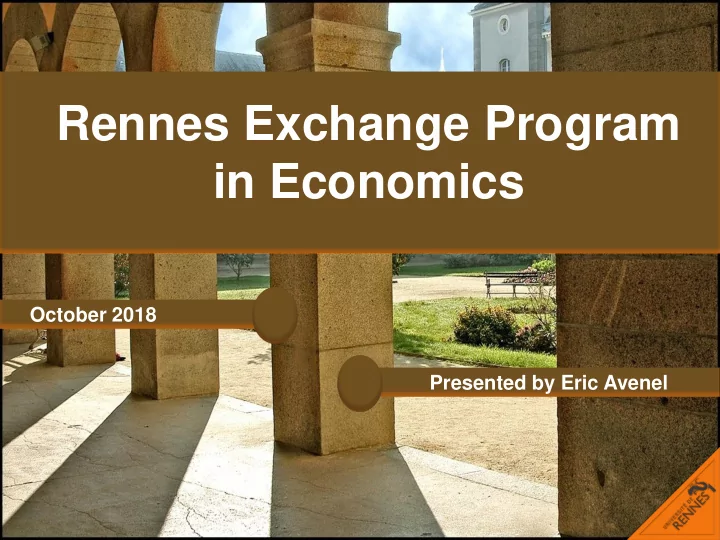

Rennes Exchange Program in Economics October 2018 Presented by Eric Avenel
The University of Rennes 1 The Faculty of Economics
U niversity of Rennes 1 3 main streams: Science, Technology, Engineering and Health Law, Politics, Management, Administration Science, Econ. Human Sciences (Philosophy and Communication) 27 733 students (3522 international ones,125 countries) Student professional integration: 92% 1830 faculty members, 340 researchers 56 partner countries, 138 bilateral partnerships, 35 double degrees 32 Research Units 6 Campuses, 57 student associations Diapason Center for Arts, 46 sport activities
T he Faculty of Economics 2711 students (1413 Bachelors, 749 Masters, 26 PHD, 391 distance learning , others 132) 3 Bachelors, 8 Masters/15 specialties 92 Professors and 350 external Professors Member of 2 research units 1 Bloomberg trading room, 1 experimental economics laboratory 1 Economics club Student professional integration: Master (91%), PHD (92%) Strong links with business world Library of photos
I nternational Openness 70 to 80 outgoing students and 60 to 95 incoming students from exchange programs each year 25 to 30 international visiting professors each year 74 international destinations 10 exchange programs including 7 double degrees One international section on one of our Bachelor degrees 1 partnership with the American Institute 1 AIESEC global youth network branch AIESEC website : http://aiesecfrance.org/ American Institute : http://www.ifa-rennes.org/index.php
L asting Partnership For more than 26 years, the Faculty of Economics has consistently worked hard at creating lasting and strong partnerships while developing new ones: Number of Number of partner Partnership created Program countries universities in Erasmus+ 14 36 1990 Quebec 1 8 1995 Bilateral partnerships 9 16 2000 Double degrees 12 12 From 2005 to 2015
The Rennes Exchange Program in Economics
P rogram location Capital City of Brittany Largest student city in Western France Major research cluster 10th largest city in France Population: 213 000 inhabitants 1 hour 25 min. from Paris, 1 hour from Nantes by train 1 hour from Barcelona, London, Berlin, Rome, Venice, Copenhagen, Faro 1 hour from the Emerald Coast Awarded France’s most pleasant city to live in 2016 by the European Commission More information on Rennes city
P rogram structure Time period: September until end of December (Fall) January until end of April (Spring) Duration: 14 weeks Content: 9 (Spring) or 6 (Fall) courses/semester + optional free French course Teaching approach: 70% lectures, 30% tutorials/group work/ games Weekly volume per module: 2 to 3 hours Group size: 20-25 Language: English Examination: ongoing assessment Prerequisites: 2 years of undergraduate studies (depending on the chosen modules, some extra academic prerequisites may be preferable)
M odule details – Fall Students have to choose at least 2 modules out of the following ones: Module 3: Module 1: Module 2: Applied Macroeconomics Microeconomics Economics and trade Macroeconomic Game Theory Statistics policies International Industrial Organisation Public economics economics More information on the course contents
M odule details – Spring Students have to choose at least 2 modules out of the following ones: Module 1: Macroeconomics, Module 2: Networks, Module 3: trade and European markets and business Econometrics and economics decisions applied economics Economic growth Risk and Uncertainty Econometrics European economics Innovation and digital networks Business intelligence International trade Business simulation Transport and logistics More information on the course contents
S upport Starting on day of arrival, the students will receive different types of support: Personal mentoring and French Buddy French tutorial at CIREFE International Integration Week Professors/Heads of programs International Mobility Center AIESEC global youth network More information on CMI More information on CIREFE More information on AIESEC More information on the American Institute
P rogram strengths No French skills required Small groups (20-25) Ongoing assessment Immersion in a new teaching approach Strong support throughout the program Intercultural awareness: students are mixed with French and International students Yearly program assessment
P rogram assessment Over the four years of existence, the program has benefited from foreign students ’ feedback: School Year Incoming students 2014-2015 1(China)+18 Erasmus Students 2015-2016 4 (China, South Korea, USA)+19 Erasmus Students 39 students (EU, Brasil, China, South Korea, Russia, 2016-2017 Mexico…) 2017-2018 32 students (EU (16), China (9), South Korea (2), Russia (5)) 2018-2019 36 students (EU(22), China (8), South Korea (4), Georgia (2))
C ost of living Suggested Monthly Budget for one student: Minimum Maximum Rent University residences : Approx. 145 200 to 400 euros (private euros or 215 euros for a room with a accommodation) private bathroom 450 euros (Host family) Around 168 euros (60 meals at the Meals Around 360 euros (60 meals at 6 euros) university restaurant) Breakfast Around 69 euros (30 meals at 2.3 Around 90 euros (30 meals at 3 euros) Euros) Drinks Around 15 euros (10 drinks at 1.5 € ) Around 90 euros Transport Around 15 euros Around 38 euros Leisure Around 76 euros Around 120 euros Social 0 euros 0 euros Security Faculty Complimentary Complimentary Registration Books 20 euros 40 euros
ANNEX
O ur degrees
D ouble degrees 7 double degrees have been launched by the Faculty of Economics and its partners: Level Topic Country Bachelor Economics and Management Germany Masters Economics and Management Germany Masters Economics and Management Spain Masters Public and Business Spain Management Masters International Business and Quebec, Sweden SMEs Masters Economics and Innovative Sweden Corporation Management Masters Public Economics Public Switzerland, Finland, Italy, Czech Finance Republic, Indonesia, Portugal, China
O ur exchange programs 10 exchange programs (including 7 double degrees) have been launched by the Faculty of Economics and its partners: Program Number of Number of partner Partnership countries universities created in Erasmus+ 14 36 1990 Quebec 1 8 1995 Bilateral partnerships 9 16 2000 Double degrees 12 12 From 2005 to 2015
Recommend
More recommend